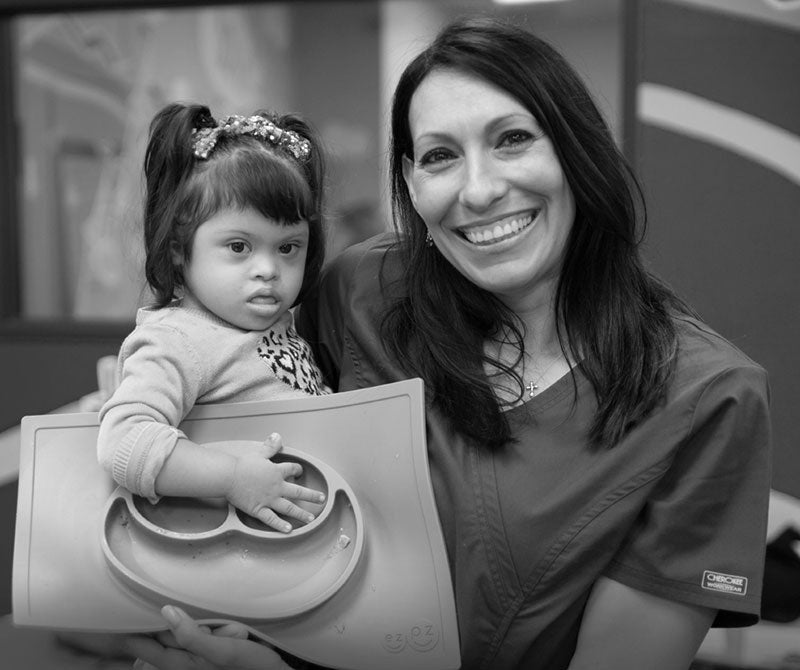Transitioning from the Tiny Spoon to the Mini Utensils
When your toddler has mastered dipping with the Tiny Spoon, then they are ready to learn how to scoop and spear! Yes – your child has graduated to the Mini Utensils, which includes a larger spoon with a firmer spoon bowl and a fork!
Transitioning from the Tiny Spoon to the Mini Spoon: Learning to self-feed is an important developmental milestone, and the ezpz Mini Utensils are designed to help your toddler learn how to eat with a spoon (scooping) and fork (piercing). Here are a few tips on making the transition from our infant spoon to toddler utensils.
- Tiny Spoon: If your baby has been independently eating from the Tiny Spoon, they have been working on their hand-to-mouth coordination. This is a critical skill for early feeders. They have also been developing good lip closure for speech and swallowing. Keep those muscles and skills going by transitioning to the Mini Spoon!
- Mini Spoon: The Mini Spoon is developmentally appropriate for toddlers since the spoon bowl is made out of strong nylon (compared to the soft silicone of the Tiny Spoon). The firmer spoon bowl provides sturdiness for toddlers who are scooping up multiple textures and consuming slightly bigger bites. Although developmental ages are approximate and vary with each child, here are the baby-led spoon feeding milestones that both spoons accelerate:
- Infant Feeding Milestone: At 4-6 months of age an infant should be able to bring their hands to their mouth while holding an object or spoon. The Tiny Spoon’s short, fat, round handle was specifically designed to make hand-to-mouth movements more effective, which helps baby meet this critical milestone!
- Toddler Feeding Milestone: Learning to scoop with a spoon is an important 12-24-month-old developmental milestone. The similar properties and familiarity of the Tiny Spoon / Mini Spoon’s handle helps to ease this transition.
Transitioning to the Mini Fork: From a development and safety standpoint, we should not expect babies to use a fork (although some babies may be ready to start early), which is why our First Foods Set does not have one included. However, toddlers are expected to learn to self-feed with a fork. Here are some tips to encourage fork use:
- Introduce After a Scooping: Once your toddler is successful with spoon scooping, then introduce the Mini Fork. Show your little one how to pierce food by demonstrating it, and then allow them to put the fork in their own mouth. You may have to preload the fork several times while introducing this new skill.
- Easy to Hold: Eating with a fork is a developmental milestone that can be frustrating for your toddler, especially if you offer a fork that is difficult for them to hold onto. That's why the silicone handle of the Mini Fork is the same as the Mini Spoon, which makes for easy motor planning to the mouth. Score!
- Strong Enough to Spear: Another infuriating problem for toddlers learning to fork-feed is not having a fork strong enough to pierce food. That’s why we have a sturdy fork-bowl made from nylon that can tackle toddler textures. Try saying that three times!
- Fork Safety: Young toddlers learning to eat will try to bring the fork tines quickly to their mouth. That’s why we designed a fork-bowl with sensory bumps (exactly like the Tiny and Mini Spoons) to provide consistent sensory awareness to the mouth to help encourage lip closure and decrease gagging / overstuffing.
Self-feeding with utensils takes repetition and reinforcement. So, be sure to have some yummy foods for your toddler to practice scooping and piercing. In no time you will have a successful utensil user! Be sure to tag us in your toddler utensil adventures by using our hashtag #ezpzfun.
Happy Feeding!
Dawn Winkelmann, M.S, CCC-SLP
SPEECH LANGUAGE PATHOLOGIST & FEEDING SPECIALIST FOR EZPZ
Dawn Winkelmann, a.k.a “Ms. Dawn”, has treated thousands of kids across the globe by helping families overcome picky eating stages and food refusals, while adding new foods into their diet. Her high success rate is attributed to Ms. Dawn bringing her education, experience, sense of humor and her favorite feeding products to the family dinner table.
You will find Ms. Dawn’s expert feeding advice to be positive and fun for the entire family! She adapts complicated feeding/swallowing research and makes it practical and easy for parents! Get ready to learn the science behind your favorite feeding products and ways to bring happy family mealtimes back!



